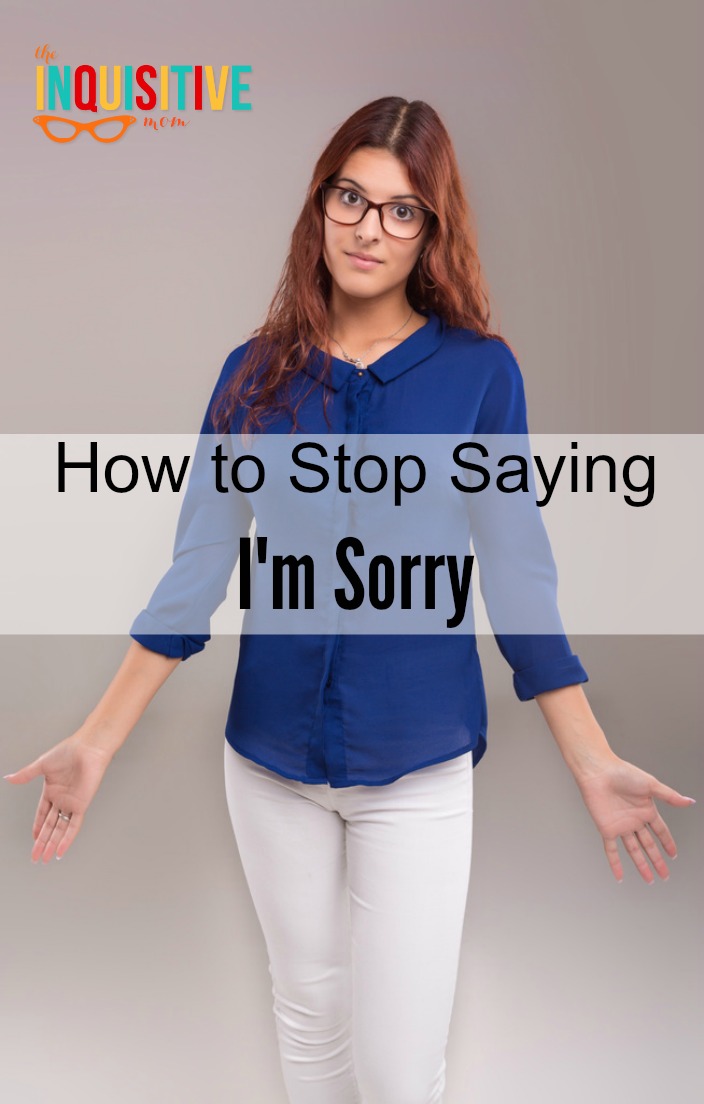Women are sorry. Sorry our house is dirty. Sorry we’re not wearing makeup. Sorry that we are. Sorry for asking questions. For being off-topic. For inserting an opinion. Sorry-i-tus is so prevalent, it sometimes feels like we’re apologizing for simply existing. We need to stop saying I’m sorry all of the time.
My Sorry Wake-Up Call
I distinctly remember my older sister chiding me for apologizing so much as a teenager. She wanted me to have some backbone, to show some confidence. I can hear her declaring in exasperation, “Stop apologizing all of the time!” My response? An agonized, “I’m sorry!”
While it might not have seemed like it at the time, my big sis did me a favor that day. Apologizing had become a language crutch for me. I used it as a default, rather than leaning into more difficult dialogue. I certainly didn’t change my ways overnight, but each time I apologized, I heard Merilee’s reprimand in my head. In fact, I hear it now more than 20 years later when I default to “I’m sorry.”
The Sorry Habit
If you suffer from Sorry-i-itus, you are certainly not alone. Excessive apologizing isn’t exclusive to women, but studies show that women have a lower threshold for what requires an apology than men. This Pantene commercial hits awfully close to home for many of us. The worst part? While Sorry-i-tus may be simply habitual or overly polite, it’s often perceived as incompetence or a lack of confidence. It can also diminish your “I’m sorry” when it really counts and irritate those around you (but don’t apologize for it!).
Reasons We Apologize When We Shouldn’t
Ready to stop saying I’m sorry when you’re not? Start listening for when you say “I’m sorry.” Tagging on a sorry may be a simple language habit. It might also reveal your insecurities in particular environments are with specific people. Start by discovering when and with whom you say “I’m sorry” the most and then work on only apologizing when it’s appropriate.
Sorry-i-tus seems to be caused by:
- Insecurities
- Self Deprecation
- Guilt
- Shame
- Seeking Validation
- Habit
- Putting Other’s Needs First
- The Need to Say Something
- Fear of Silence
- Having Feelings and Fear of Appearing Overly Senstive
- People Pleasing
Thankfully, Sorry-i-tus isn’t incurable. We can actually change the sorry habit and feel more confident, secure, and self-aware in the process. Here are a few tips to help us stop saying I’m sorry all of the time:
- Recognize When to Be Sorry. You are not expected to erase “I’m sorry” from your vocabulary entirely. Allow yourself to embrace sorry when you step on someone else’s toe (but not when they step on yours), when you hurt someone, and when you break a rule or the law. This will make your “sorry” more honest and sincere in the long run.
- Recognize When Not to Be Sorry. You do not need to apologize for your presence; not for taking up space, time, or energy. Do not apologize for things that are outside of your control. You do not need to apologize for other people’s mistakes, for questions, or for contributing an opinion.
- Change Your Language. Replace “I’m sorry” with a new habit. This could begin with using “pardon” or “excuse me” instead. You could practice taking a deep breath before speaking, instead of inserting “sorry.” Say “thank you” for waiting, for listening, etc, as illustrated in this amazing comic. If you struggle with being assertive, replace “sorry” with “I would like to add” or “I appreciate your input. I think…” Teach yourself to let silence be okay and don’t apologize for gaps in conversation or taking your time to think. Consider saying, “Let me think a moment,” or “I’m thinking this through” or “I’m working on an idea.”

- Acknowledge Your Feelings. Saying “sorry” can break your self-esteem over time. It can also serve as a way to dismiss your own, or even other’s, feelings. “Sorry” can be a quick way to avoid a disagreement, deflect hurt, or prevent discomfort. Pay attention to how you feel when you over apologize and allow yourself those feelings.
- Stop Interrupting and Really Listen. I used to call myself a “chronic interrupter.” Rather than tackling that bad habit, I kept interrupting and apologizing for it. My “sorry” habit kind of spiraled from there. I realized that I was a terrible listener, always thinking of the next thing to say. When I stopped to really listen and allow natural pauses in conversation, I didn’t need to interrupt or be sorry for being a bad listener. I also became a much better friend.
- Say No. How many times do we say “yes,” when we should actually say no? Maybe we just don’t want to. Maybe it doesn’t work with our schedule, our talents, or our interests. Saying “yes” to something we don’t/can’t do sets us up to say “I’m sorry” as we rush in late, do a half-hazard job, or lack the energy to do a job well. Say “yes” when you can and don’t apologize for saying “no.” Try “That won’t work with my schedule, but please ask again,” or “I think my talents would better serve a different committee” or “I appreciate you thinking of me, but I have other commitments.”
- Be Kinder to Yourself. We are our own biggest critics. Based on our own personal assessments, we’ll never be pretty, clever, or interesting enough. Our houses will inevitably be too messy. We are sure to get something wrong. It’s pretty likely that others are not judging us so harshly and it’s their problem if they are, not ours. Practice self-compassion to combat Sorry-i-tus.
Do you struggle with saying “I’m sorry” too often? What’s your biggest hurdle?



Leave a Reply